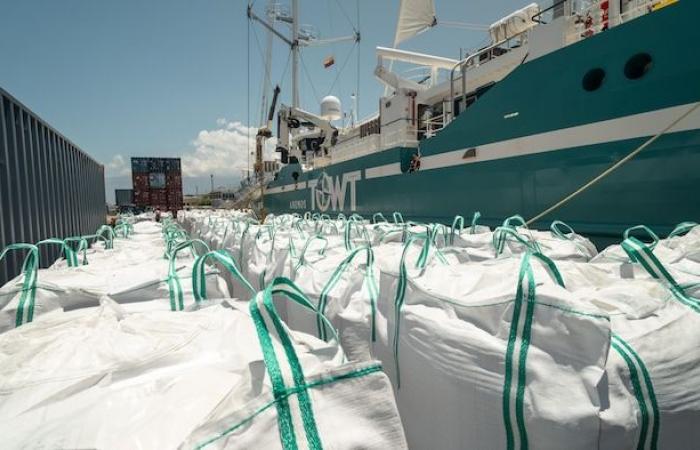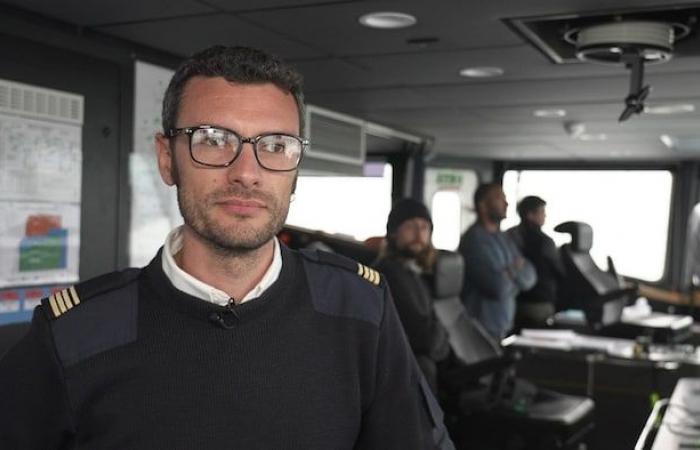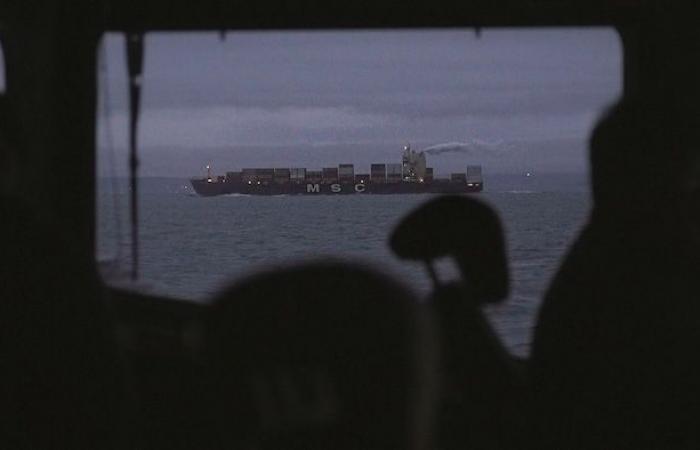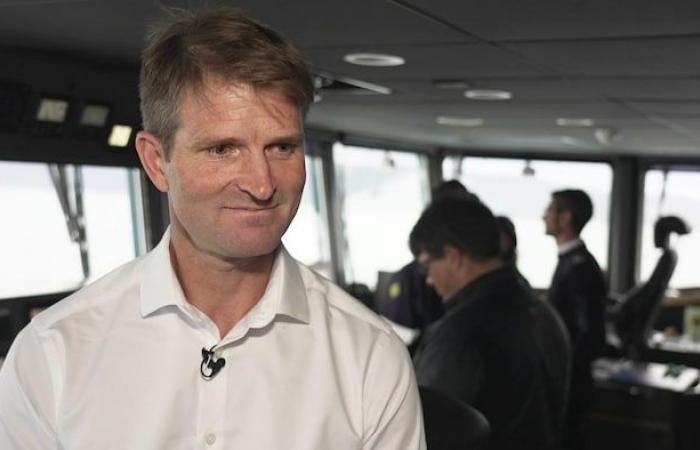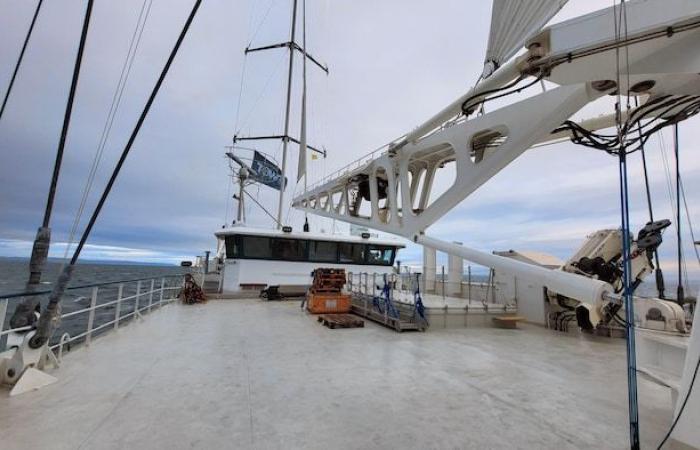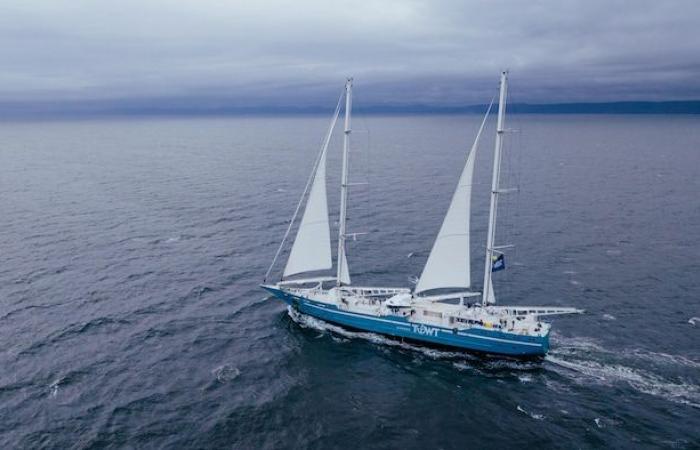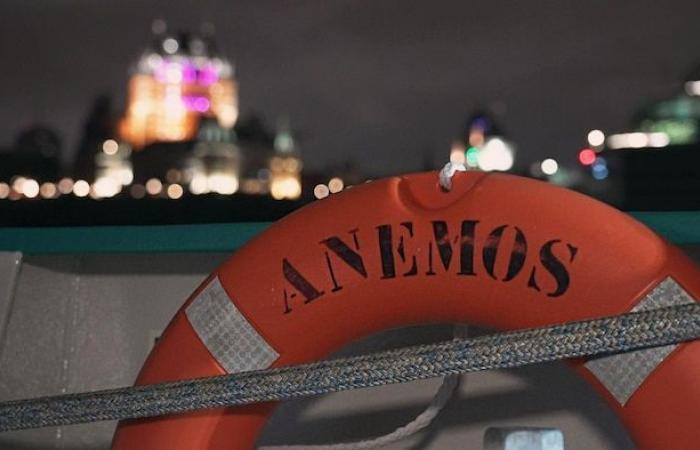The Anemos crosses the St. Lawrence channel for the first time. The largest purpose-built cargo ship to date is loaded with coffee. His most recent mission took anchor in Santa Marta on the coast of Colombia with the port of Quebec as his destination. The trip lasted 15 days.
The cargo sailboat set sail with 50 containers of coffee beans totaling one million kilograms on board. A thousand metric tons were thus pushed mainly by renewable and abundant energy at sea: wind.
Open in full screen mode
The Anemos delivered 1 million kilograms of coffee to the port of Quebec.
Photo: Courtesy Café William
The captain on board used to sail for pleasure and enjoys rediscovering rediscovered know-how
. They are the same physical principles. It’s a change of scale
simply sums up Hadrien Busson, at the controls of the 81 meter long ship.
He spent more than ten years on an oil tanker before making the big change that allowed him to navigate in line with his values. When the opportunity presented itself, he didn’t hesitate.
Since its recent construction in March 2023, the Anemos has transported jam, spirits and cocoa. We can deliver everything
enthusiastically summarizes Hadrien Busson.
Open in full screen mode
Captain Hadrien Busson took command of the Anemos, construction of which was finalized in March 2024.
Photo : Radio-Canada / Marc-André Turgeon
We are ultimately a small drop in the ocean, but the objective is to design and participate in the creation of a model that is viable over the years.
he says with conviction. We think that sailing transport has a bright future!
This is a vision adhered to by Café William, who chartered the cargo sailboat.
We might be the first ones crazy enough to try it!
Revolutionizing coffee transportation
The Sherbrooke company wants to pave the way and aims, in its own way and on its own scale, to contribute to decarbonizing the maritime industry.
This cargo represents between 10 and 15% of its annual volume.
Coffee is the most consumed beverage in North America. Then unfortunately, it is one of the beverages that has the largest ecological footprint on the planet. (…) One of the big contributors is transport
explains Serge Picard, co-owner of Café William. I think the status quo cannot be maintained.
Its objective: for all its coffee beans from the Americas to be transported by sailboat within two years, which constitutes almost half of its imports. Ultimately, the company wants its coffee, which grows in Africa and Asia, to also bear the seal of transport by sail.
The objective, which is a little aggressive, is to establish a new standard for the industry
says Serge Picard, co-owner and head of innovation and business operations at Café William.
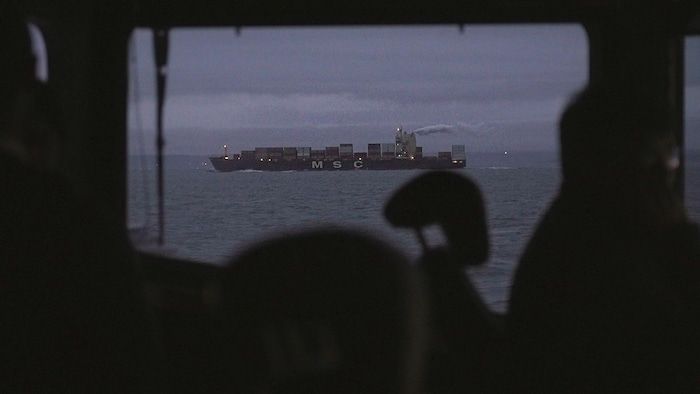
Open in full screen mode
The shipping company Towt, which owns the Anemos, estimates that the cargo sailboat emits 90% less CO2 emissions than a traditional container ship.
Photo : Radio-Canada / Marc-André Turgeon
Navigation challenges
The ship is dependent on the winds in order to minimize the consumption of CO2 emissions, but it can still continue its journey when the winds are not favorable.
We have sails, which are the primary navigation system, but we also have diesel engines which can propel us and possibly electric motors which can also propel us, so in fact it is very very modular.
explains the captain. This combination of different technical systems allows us to adapt at any time and choose the optimum system to consume the least amount of oil and reduce emissions as much as possible.
As is the case with all merchant ships that pass through Les Escoumins, the cargo sailboat is taken care of by a licensed pilot, considering the shallow depth and narrowness of the St. Lawrence. Vincent Lanouette is the river expert commissioned for this epic. We’re not used to this, but it’s interesting to see that it’s possible!
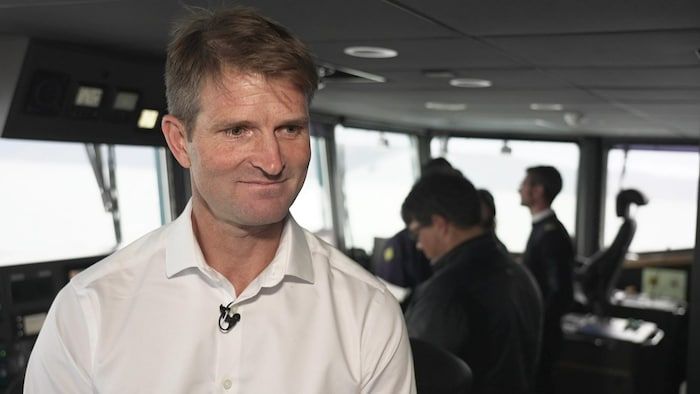
Open in full screen mode
The vice-president of the Corporation of Bas-Saint-Laurent Pilots is a sailing enthusiast. Taking command of a cargo sailboat is also a first for Vincent Lanouette.
Photo : Radio-Canada / Marc-André Turgeon
What you need is to have an angle that is favorable between the wind and the ship’s heading. It was possible, we had good speed. It was impressive!
Most of the section between Les Escoumins and Quebec City will have required the activation of the motors due to currents. against the rest of us
illustrates Vincent Lanouette. A headwind would have slowed the boat considerably. Still, the piloting we do is still a tiny part of the journey.
he nuances.
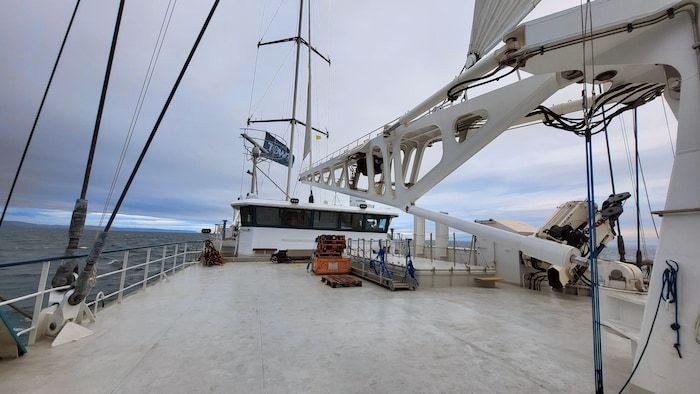
Open in full screen mode
The trip aboard the Anemos between Les Escoumins and Quebec lasted approximately 13 hours.
Photo : Radio-Canada / Marc-André Turgeon
A model commendable
which has its limits
Shipping company Towt has launched two cargo sailboats in the past year, including the Anemos, and plans to build six more by 2028.
It estimates that a cargo sailboat reduces CO2 emissions by 90% compared to a conventional container ship.
This is extremely commendable
says professor at the University of Quebec at Trois-Rivières, Jean-François Audy. Decarbonization is a contemporary challenge. There are no small savings and there will not necessarily be a solution. (…) Could this opportunity replace or take certain market shares? Certainly. But to think that we can scale it up overnight… definitely not
balances those who are interested in sustainable and intelligent maritime transport within the Réseau Québec maritime organization.
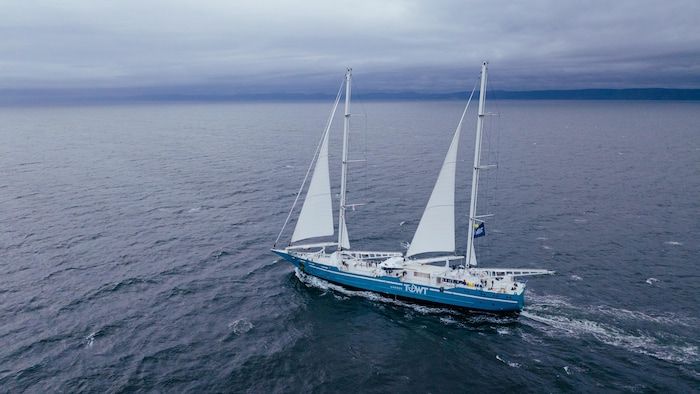
Open in full screen mode
The Anemos sailed the St. Lawrence River in hybrid mode, alternating between sails and engines.
Photo: Courtesy Café William / Basalte et Volcano Médias
The proliferation of cargo sailboats could put some pressure on supply chains and congest port infrastructure
. The expert sees this as a logistical challenge.
There would probably not be enough capacity on a large scale to be able to manage all these small batches, whereas historically in recent decades, we have converged towards larger ships and larger facilities to be capable of handling larger transit volumes
explains Jean-François Audy.
Based on the experience he has just had, pilot Vincent Lanouette is optimistic. For a type of cargo, in certain conditions, clearly it works
he said. Of course, the vagaries of Quebec winters can pose constraints, but there is sincerely an effort that can be made with the aim of being more carbon neutral
believes the river expert.
This is also the deep conviction of Serge Picard, which raises strategic advantages. The Anemos took two weeks to arrive at its destination while a traditional container ship chartered by Café William gets there in 4 to 6 weeks. These larger ships certainly go faster at sea, but also make more stops, he explains. For the co-owner of Café William, this is the beginning
of adventure.
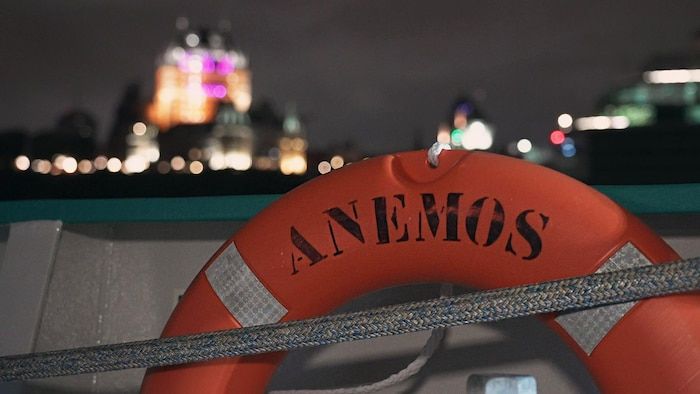
Open in full screen mode
After delivering jam and cognac to New York, the Anemos made its very first coffee trip to Quebec. The cargo sailboat will set sail again towards Le Havre for an upcoming shipment of spirits.
Photo : Radio-Canada / Marc-André Turgeon
Docking at the port of Quebec in the early morning after two weeks at sea, the members of the Anemos crew are delighted to discover the illuminated Château Frontenac. For them, the mission they have just accomplished creates a small revolution in the industry and opens the way to a new way of thinking about freight transport.

